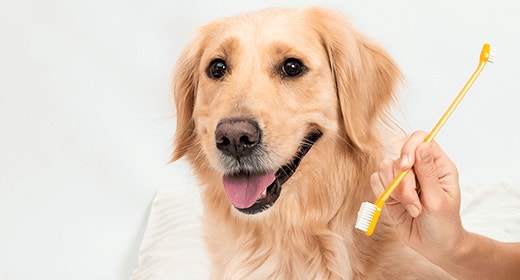

Dogs need regular dental care just like you do; gum disease and broken teeth are the major concerns. Fortunately, pets seldom suffer from tooth decay. Their cone-shaped teeth, non-acidic saliva, and low-sugar diets all help protect them from this nasty ailment. (Note: If you give your pets sweets for snacks, they can get cavities.)
Regular brushing and professional cleaning can keep your dog’s teeth healthy and gleaming. Giving your pet appropriate toys to chew prevents fractures.
Periodontal disease affects the gums, bones, and connective tissue around the teeth, and it can cause tooth loss. First, plaque—a soft, clear, or cream-colored deposit—forms on the teeth. If it isn't removed, minerals in the dog's saliva turn plaque into tartar. Tartar builds up below the gums, and bacteria grows, causing inflammation.
The same bacteria that causes the inflammation can enter your pet's bloodstream and cause or aggravate lung, kidney, liver, and heart problems. That's a lot of trouble, worry, and cost from something that could be stopped in its early stages.
When your puppy first begins to get permanent teeth, check carefully to be sure the baby teeth come out as the new teeth come in. Retained teeth can cause the permanent teeth to be crooked. Toy dog breeds, with their tiny jaws, are at special risk for this problem.
While hard foods and chew toys can help keep teeth clean, you need to get your pet used to regular tooth-brushing. As soon as you bring your new pet home, get him accustomed to having his mouth handled. This is good practice for dogs that will be shown; judges check to make sure dogs have their full set of teeth. It is also good training—it teaches the dog to tolerate having things in his mouth without biting or snapping.
What your dog eats affects his 'smile.' Dry foods and treats help clean plaque from his teeth. Rawhide chews are also good cleaning tools, as are some of the knobby plastic toys on the market. None of these are hard enough to cause tooth damage, but be sure to watch your pet to make sure small pieces of the toys aren't torn off and swallowed. Real bones can also be dangerous for your pet and should not be used for tooth-cleaning purposes.
All dry adult IAMS™ Dog Foods, such as IAMS ProActive Health™ Adult MiniChunks, include Daily Dental Care, a special kibble coating that helps reduce tartar buildup for better oral health.
It just takes a little time and patience. Begin by running your finger gently over his gums. At first, just rub the outside, but as he adjusts to the routine, begin to open his mouth and rub the gums inside the teeth as well.
As your dog gets accustomed to this, wrap your finger with gauze and rub his gums. Eventually, add a pet toothpaste; do not use human toothpaste. After a few weeks, your dog should be willing to accept a toothbrush for pets, which should have soft, multi-tufted synthetic bristles.
Hold the toothbrush at a 45-degree angle and apply it to the area where teeth and gums meet. Rotate it in small circles, overlapping several teeth. Finish with vertical strokes to pull plaque from between the teeth. Repeat until all the teeth on the cheek side are clean. The inside teeth will be more difficult, as your dog may resist opening his mouth, but eventually you'll be able to brush the inside and outside surfaces of all the teeth. For effective cleaning, brush your dog's teeth a couple of times a week.
If your dog won't cooperate with home brushing or if you already see brown tartar stains on his teeth or red and bleeding gums, it's time to turn to your veterinarian for help. He or she will give your dog general anesthesia and clean the teeth above and below the gum line to remove plaque and tartar. After the teeth are cleaned, they will be polished to remove microscopic plaque and to make the teeth smooth to discourage plaque from clinging.
Remember, dental care is as important to your pet's health as it is to your own—you owe it to your dog to provide regular tooth care and cleaning.


Low-cost food might be better for your wallet, but it can be a raw deal for your dog, because he may not get the nutrition he needs. Premium foods, such as IAMS™ ProActive Health™ Smart Puppy Original , make sense both nutritionally (because of consistent, high-quality ingredients) and economically because they provide:
The investment in a premium food might initially cost more per bag, but because these high-quality formulas are high in nutrient density, your dog may need less food, which can offset the higher cost per unit of weight. On a cost-per-feeding basis, look at how much you feed each day as opposed to how much the bag costs, because nutrient and energy density will generally be lower for a low-cost food compared with premium foods.
With budget-priced formulas, the emphasis is on production and ingredient costs. Two bags of the same least-cost formulated food can have different ingredients and/or levels of ingredients. Plus, those ingredients may vary significantly in digestibility. This means, simply, that you may need to feed more just to equal the nutrition offered by a smaller amount of a premium dog food formula.
High-quality, complete, and balanced premium dog foods such as the IAMS brands are specifically designed to provide your dog with a food that has:
To determine how much food to give your dog, check the daily feeding recommendations set by the pet food manufacturer and read the label. To calculate portion sizes, divide the total daily recommended amount by the number of times (usually two for adult dogs) you plan to feed your dog.
To tell if your dog is at a healthy weight, move your hands along his sides. If you can feel his ribs, he's about right. Or, look down at him when you're directly above him. You should be able to see a waistline.
If he's gaining or losing a lot of weight, slightly decrease or increase his daily intake and weigh him in another week. If you have specific concerns about your dog's weight, talk to your veterinarian. He or she can assess your dog's needs and make a feeding recommendation.
Once you've decided on a premium formula, you have another choice to make: dry or moist. And what about biscuits?
Premium dry dog food gives you the best value and convenience, while fortifying your dog with high-quality nutrition. Premium dry foods come in a number of bag sizes and formulas suited to size, life stage, and activity level. Dry food also helps keep teeth clean, and it stays fresh for a long time if you store it properly.
Wet foods from IAMS provide 100% complete nutrition. IAMS ProActive Health Puppy Biscuits make great treats and rewards and can add taste variety to your new dog's diet.